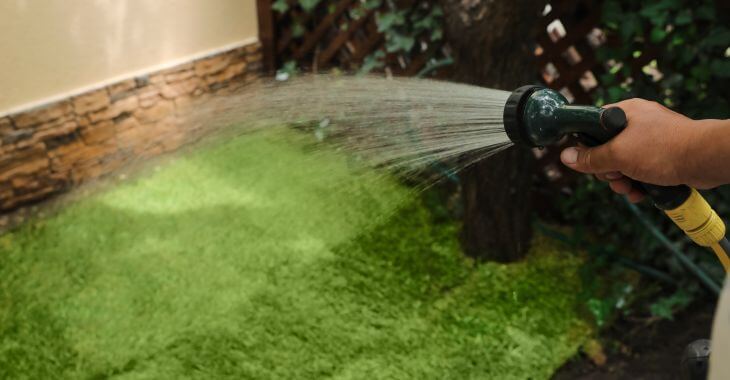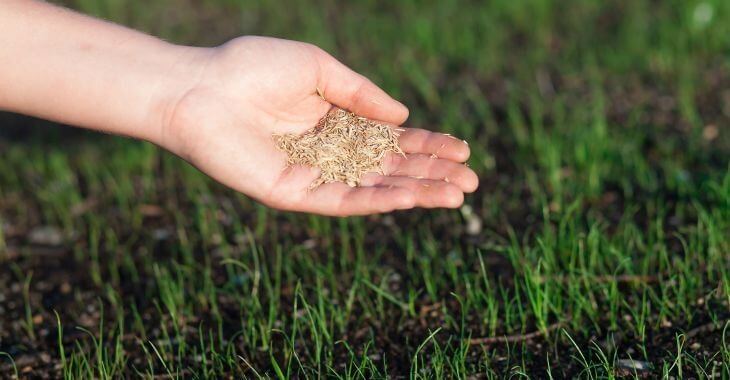How Often to Water Grass Seed for Best Results

Are you planting a new lawn, or do you want to replenish a thin lawn? Growing grass from seed takes time, but it is the most economical option for creating a thick, beautiful lawn. Whether you are starting a new lawn or overseeding, your grass seeds will need water and nutrients to thrive. If you wonder how often to water grass seeds to get the best results, here are some tips for nurturing grass seeds.
Most grass seed will take up to 14 days to germinate and then another 2-3 weeks to mature. While this may seem like a simple process, there are many factors that can impact the seed germination and growth. Simply spreading grass seed on the soil and waiting for grass to grow is not enough to get a thick, healthy lawn. You need to be aware of several factors and provide the needed nutrients to grow grass from seed, including knowing how often to water new grass seed to help it sprout and thrive.
Purchasing and Spreading Grass Seed
The first step in planting or overseeding your lawn is purchasing your grass seed. You will want to research the best grass seeds for your region’s climate and your desired results. There are cold and warm climate grasses, and various traits that can improve its appearance and maintenance. It is also important to buy new seed – grass seed does expire, and you will have a harder time planting a thick lawn from outdated seed.
Once you have your new grass seed, you can use a spreader to evenly disperse the seed on your lawn. You should first prepare the soil or lawn for seeding – follow the instructions for your seed for the best results. Most seed companies will suggest applying fertilizer and weed control before you spread the seed on your lawn. This gives your new seed the nutrients it needs from the start and prevents weeds from stealing the provided nutrients from the soil. You will also want to ensure the soil is moist before you plant your seeds.
How Often to Water New Grass Seed
Water is essential for growing grass from seed. While grass seeds need sunshine, air and nutrients from the soil, without water they will not sprout or grow. Grass seeds can sprout in the dark as long as they have water, but they will not germinate without water. Before you plant your grass seeds, you should water your lawn or soil to prepare it for the new seeds. Once you spread your grass seed, you will need to water your grass seed, but it is important to know how often to water grass seed and how much water to give your lawn.
The trick in watering new grass seed is to give it enough water, but not too much. If you overwater your lawn and grass seeds, they can wash away before they are able to germinate. Too much water can also suffocate the seeds, halting their growth. You want enough water to feed the seed without soaking the ground.
Watering Schedule for New Grass Seeds
For the first two weeks after seeding, your lawn should be watered in short, frequent bursts. Watering your lawn for less than 10 minutes two or three times a day is a good starting point. This gives the soil and seed the water it needs without saturating or washing away the new seeds before they can sprout. This equals about 3-4 inches of water per week without dumping too much water at one time.
Once the grass seed sprouts, you will want to change your watering schedule. You no longer need to water the grass seed more than once a day, but the length of time should be extended. A long soak once a day will help the new grass form deep roots. Water your newly sprouted grass seed for about 30-40 minutes once a day for the first week, then start alternating days. After one month post-seeding, you should be watering your new grass two or three times a week for about a half hour. This will encourage deep grass roots.

It is important to factor rainfall into how often to water grass seeds. If it rains, you may be able to skip a watering. Keep in mind that too much water can be as detrimental as not enough when the grass seed is trying to germinate.
If you are planting new grass seed for your lawn, there are many factors that can contribute to the results. For the best results, you need to properly prepare your soil and know how often to water new grass seed. To ensure you get the thick grass you desire for your lawn, talk to your local landscaper for tips or help planting your new lawn.

